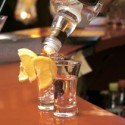Overcoming a drink problem
If you think you drink too much, and you are not content with that, then you need to take action.
Nobody can force you to reduce your alcohol intake, or make you seek professional help. The only person who can take responsibility for your drinking is YOU. No one else can change your lifestyle, but here are a few tips to start you on your way:
First, you need to review your lifestyle; identify those times and places when you’re most likely to reach for a drink, or people who make you think of drinks. From the bar after work to the weekend with friends, if you know you’ll be tempted then think about steering clear.
Make an excuse or go but limit yourself. Alternatively, try turning up later than usual, to minimise your drinking time, or kick off with a soft drink to stop you from feeling so thirsty.
You need to drink for the right reasons, not just for the sake of it. Try to associate drinking with celebrations and events, rather than a means of blotting out your problems or propping up your self-confidence.
Also think of alcohol as something you do as a complement to another activity, instead of something you turn to for its own sake.
If you do indulge, pace yourself; binge drinking is dangerous, as your body can only process one unit of alcohol per hour. The more rapidly you drink, the more intense the effects will be, but that doesn’t make the experience any more enjoyable. If you find it hard to apply the booze brakes, try putting your drink down more often.
If it isn’t in your hand all the time, you’re less likely to drink it so quickly. Then try and take a break, play some pool, or leave the bar. Try phoning some old friends for a bit or try phoning somebody at home, since they may remind you of heading home.
It can also help to learn new bar habits. If you’re at the bar with a glass in your hand, try talking more. Use your mouth for something other than boozing and you’re less likely to fall down at the end of the evening.
Getting in something to eat can also have the same stalling effect – though be careful with salty snacks, as it could just stoke your thirst.
And, the old cliche – know your limits. Before you start drinking, be sure you know when to stop. Think of a particular limit.
Decide in your mind that no matter what happens you are not drinking beyond three bottles. This can be hard when everyone else is boozing, but practice makes perfect. It also avoids bad hangovers.
Ideally, though I know it can be hard, try not to exceed the recommended daily intake limits as laid down by the government – two or three units for a woman, three or four for a man.
Try to take a break from your boozing. If you’re worried about drinking, but you don’t fancy quitting completely, then set aside an alcohol-free period every now and then, preferably two days after five boozing days or every Sunday.
It might be one day in a week or a month, but even a temporary hop onto the wagon can be enough to keep the issue alive in your mind.
Ultimately, the more switched on you can be about your alcohol intake the less likely it is that you’ll run into problems. That’s not to say you can’t have fun, but go bowling or to the cinema instead!
If you’re really worried, don’t be afraid to seek help. Facing up to the fact that you may have a drink problem takes guts.
It is perhaps the most courageous step you can take towards regaining control over your life. Help is out there too, from confidential telephone support to face-to-face counseling, and more, but it’s down to you to ask.
source: Portsmouth Students’ Union

